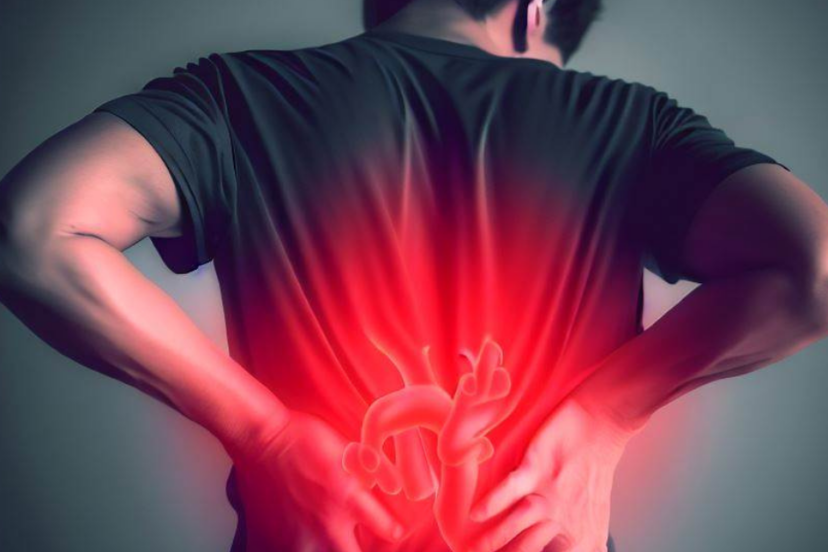It’s crucial to be aware of the signs and symptoms that may indicate a serious condition, such as a heart attack. In this article I will discuss potential linkages of Back Pain with a Heart Attack .
While chest pain is often associated with a heart attack, symptoms can manifest in various ways, including back pain.
In this article, we will explore the relationship between back pain and heart attacks. I will provide helpful suggestions and reasons for recognizing the
signs and seeking appropriate medical attention.
Understanding Back Pain
Back pain is a common ailment that affects millions of people worldwide. It can have various causes, including muscle strain while exercising,
squatting, poor posture, or underlying medical conditions. Symptoms may range from mild discomfort to severe pain and can impact daily activities. It’s important to understand the nature of back pain to distinguish it from potential heart-related issues.
Recognizing Heart Attacks

A heart attack occurs when the blood flow to the heart is blocked, usually due to a clot. While chest pain is often considered the primary symptom of a heart attack, it’s essential to be aware that
symptoms can vary from person to person. Other signs may include shortness of breath, nausea, dizziness, and pain radiating to different parts of the body, including the back.
Link Between Back Pain and Heart Attacks

Back pain can be associated with heart attacks through radiating pain or referred pain. Radiating pain occurs when the pain starts in one area but spreads to other regions. In the case of a heart attack, the pain may originate in the chest and radiate to the upper back. Referred pain refers to pain felt in an area distant from the source of the problem. The heart and the back share nerve connections, which can cause back pain during a heart attack.
When to Seek Medical Attention
Recognizing the signs of a heart attack is crucial for timely medical intervention. If you experience back pain in conjunction with other symptoms such as chest pain, shortness of breath, or dizziness, it’s essential to seek immediate medical attention. Don’t dismiss the possibility of a heart attack solely based on back pain, as it can be a warning sign of a more serious underlying condition.
Managing Back Pain and Heart Health
While back pain itself may not always be an indicator of a heart attack, it’s important to maintain overall heart health to reduce the risk of cardiovascular diseases. Adopting a healthy lifestyle, including a balanced diet, regular exercise, and avoiding tobacco and excessive alcohol consumption, can positively impact both back health and heart health. Engaging in activities that promote flexibility, strength, and cardiovascular fitness can help prevent enhance heart function.
Conclusion
It’s essential to recognize the signs, including chest pain, shortness of breath and other associated symptoms. These symptoms should not be ignored and should prompt immediate medical attention. Remember, timely intervention can be life-saving.
FAQs
1. Can back pain alone indicate a heart attack?
Back pain alone is not a definitive sign of a heart attack. However, if you experience back pain in conjunction with other symptoms like chest pain, shortness of breath, or dizziness, it’s crucial to seek medical help.
2. Are there any specific risk factors that increase the likelihood of back pain being related to a heart attack?
While anyone can experience back pain, certain risk factors such as age, smoking, obesity, high blood pressure, and a family history of heart disease can increase the chances of back pain being linked to a heart attack.
3. Can stress contribute?
Yes, chronic stress can contribute to both back pain and heart attacks. Stress can cause muscle tension and increased blood pressure, which can lead to back pain and cardiovascular issues if left unmanaged.
4. What should I do if I experience sudden, severe back pain along with chest discomfort?
If you experience sudden, severe back pain accompanied by chest discomfort or other signs of a heart attack, call emergency services immediately. Do not delay seeking medical help.
5. Are there any preventive measures I can take to reduce the risk of back pain and heart problems?
Yes, adopting a healthy lifestyle is crucial. Maintain a balanced diet, engage in regular exercise, manage stress levels, avoid smoking, and monitor your blood pressure and cholesterol levels. These measures can help reduce the risk of both back pain and heart problems.
Remember if you have concerns about back pain or suspect a heart attack, consult a healthcare professional for acurate diagnosis and appropriate treatment.
*We may earn a commission from purchases made through our links, at no cost to you. This does not affect our product recommendations. Please see our disclosure to learn more.


![Urban Health Hive]](https://urbanhealthhive.com/wp-content/uploads/2023/05/cropped-cropped-Health_Logo.png)



